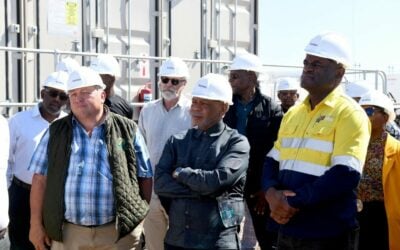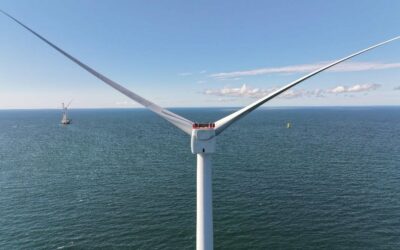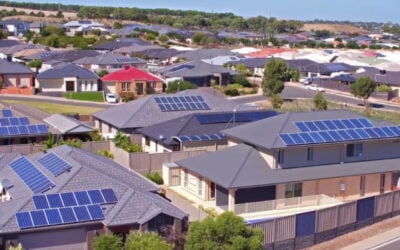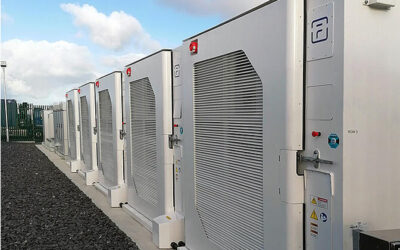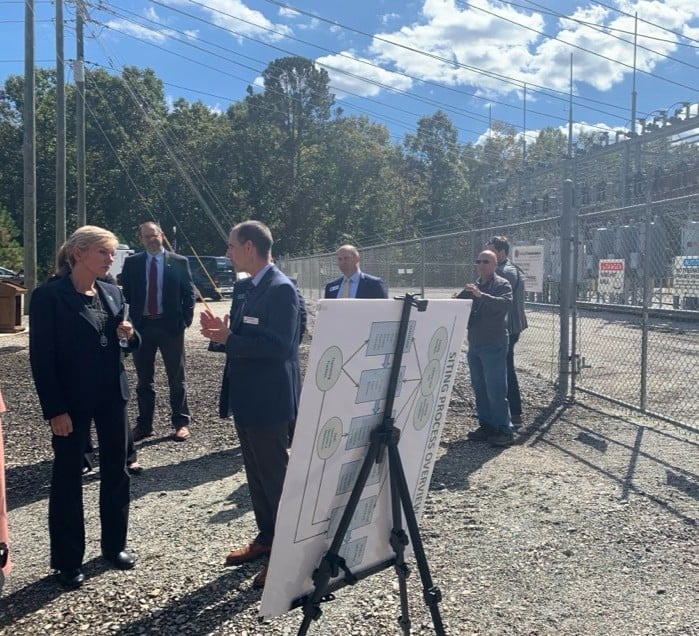
A US$10.5 billion programme to “strengthen grid resilience and reliability” across the US includes funding for microgrids and other projects that will integrate battery storage technologies.
The Grid Resilience and Innovation Partnerships (GRIP) programme was announced yesterday by US Secretary of Energy Jennifer Granholm and White House Infrastructure Implementation Coordinator Mitch Landrieu.
Enjoy 12 months of exclusive analysis
- Regular insight and analysis of the industry’s biggest developments
- In-depth interviews with the industry’s leading figures
- Annual digital subscription to the PV Tech Power journal
- Discounts on Solar Media’s portfolio of events, in-person and virtual
Or continue reading this article for free
The pair also announced the recipients of funding selected for the programme’s first US$3.46 billion of awards.
It will do this in the pursuit of making affordable low carbon energy available to as many communities as possible, particularly as the need for grid hardening in the face of extreme weather events grows.
Spreading the investment across 58 projects in 44 US states and paid for through the Bipartisan Infrastructure Law, the initial disbursement will lead to the deployment of more than 35GW of additional renewable energy capacity and 400 separate microgrids, according to the Department of Energy (DOE).
“Extreme weather events fueled by climate change will continue to strain the nation’s aging transmission systems, but President Biden’s Investing in America agenda will ensure America’s power grid can provide reliable, affordable power,” US Secretary of Energy Jennifer Granholm said at yesterday’s launch.
Selected projects in what Granholm called “the largest-ever direct investment in critical grid infrastructure” will be carried out by utility companies, electric cooperatives, local communities and organisations such as the Electric Power Research Institute (EPRI).
Funds will leverage US$8 billion in private investment, DOE says
The DOE claimed the public money will leverage a further US$8 billion in private investment, with applicants required to put up a share of funding that in most cases matches or exceeds their grant award.
It is being directed with a focus on underserved communities and working with unionised labour – three-quarters of the selected projects have involvement from the International Brotherhood of Electrical Workers (IBEW).
The list of projects is therefore long and includes a wide variety of initiatives, technologies and mitigation measures alongside the hundreds of (mostly) solar-plus-storage microgrids, including enhancements to the grid from software to high voltage DC hardware level, better integration of distributed energy resources (DER), direct wildfire mitigation efforts and others including community battery storage.
One example is a consortium of state agencies led by the Georgia Environmental Finance Authority (GEFA), which was selected to receive around US$250 million of GRIPS programme funding, which it said would be used towards a total US$507 million investment in clean energy and grid resilience development.
The Georgia funds will benefit rural consumers in disadvantaged communities through a combination of battery storage, microgrids and grid reliability measures, along with new transmission lines and advanced grid control systems.
Elsewhere, investor-owned utilities got funding too. DTE Energy in Michigan got awarded US$22.7 million to create a network of “adaptive” microgrids that would include 12MWh of battery storage and 500kW of solar generation. DTE’s microgrids could reduce outages for customers within those areas by 50% to 80% and reduce the runtime of diesel generators by 294 hours, or 5% per year.
Utility Xcel Energy got a US$100 million award to improve resilience and reliability in Colorado, Minnesota, New Mexico, Texas and Wisconsin service areas. That includes funding for the company’s Resilient Minneapolis Project, which provides solar, battery storage and microgrid tech to strengthen community resiliency in underserved communities, including communities of colour.
The DOE noted that the GRIPS programme is complementary to the department’s Grid Resilience State and Tribal Formula Grant Program, which helps states, territories and Tribes to protect their energy systems against extreme weather and natural disasters, also funded through the Bipartisan Infrastructure Law.
The passing of the Bipartisan Infrastructure Law was one of the first big policy wins for president Joe Biden after taking office in 2021 and sits alongside the more recent Inflation Reduction Act (IRA) as the key pillars of the Biden-Harris administration’s toolkit to fight the climate crisis and stimulate economic growth. The Bipartisan Infrastructure Law has already played its part in spurring upstream investment in the battery sector, with a US$2.8 billion commitment of grants for domestic manufacturing announced a year ago in October 2022.
“Today’s announcement represents the largest-ever direct investment in critical grid infrastructure, supporting projects that will harden systems, improve energy reliability and affordability—all while generating union jobs for highly skilled workers,” Granholm said yesterday.
To see a full list of projects and factsheets on each of them, go here.

